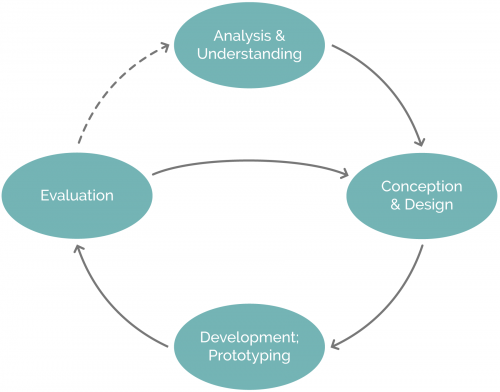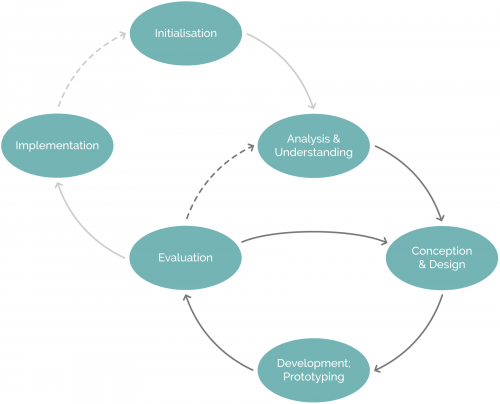Article
UCD 1/5 User Centered Design
The first episode of the User Centered Design series gives an overview about the process, preconditions and the development phases.
Motivation and Definition
The Pixar animation short film Lifted
from 2006 shows in a funny way what user interfaces look like if users are not in the centre of the design process.
UCD is an open collection of iterative process models for analysis, design and evaluation for iterative systems of which humans and their goals, characteristics, needs and environments are set in the foreground.
What that means is, users are early, permanent and sustainable included in the design and engineering process. The focus thereby is on users tasks, skills, limitations, needs, assumptions, wishes, expectations and the context of use.
The iterative approach stands for the repetition of development phases until the goals are reached. This phases are toolkits and choosing the appropriate tools is part of the process.
Errors, mistakes or negative developments can by detected before corrections becoming time and budget consuming. Success is defined be quantifiable and measurable usability criteria and goals are achieved by taking different limitations into account.
Synonyms
- User-Centered System Design
- User-Centered Development
- Human-Centered Design
- User-Driven Development
Related Terms
- Design Thinking
- Contextual Design
- Scenario Based Design
Precondition
There are helpful tools like Design Patterns and Styleguides but knowing the Human System Interaction fundamentals is essential.
Before we can focus on the user we have to know the human. How does the human memory, perception, attention and learning work and what are mental models, metaphors and error models? Besides psychology, the human physiology plays an important part as well and even sociology is a field of interest.
An other element to understand is the operating principle of the system and how technical components and peripheral devices work. We have to know the types of interaction and also things like division of labor and relationship between human and computer is part of it.
I will not go into this topics, maybe they are part of a future Human System Interaction series.
Process Phases
Analysis and Understanding
In the first phase, we are concerned with user research, task, problem and context analysis. The gathered informations need to be structured, understood and rated. After that the system requirements are formulated.
Conception and Design
Now it is time to be creative; collecting ideas and developing the concept and design. The goal is to find a concrete solution based on the requirements specification.
Development; Prototyping
Prototyping describes the development process starting by sketches and goes on to sophisticated models which can evolve in the final product. Prototypes are test object used with users to review the concept and design.
Evaluation
Is an early, qualitative and informal determination and validation of usability requirements. The current level of interface development is reviewed and compared with the previous and other designs.
Iterative Process
The following illustrations are intended to showcase the elementary workflow and don't represent any of the named process models.
The main process starts with analysing followed by conception and design, than it goes on with prototyping and after that comes the evaluation. The last three phases are repeated until the system meets the requirements. If at some point the evaluation reveals major misunderstandings regarding the users, context of use or tasks, the analysis phase is back in focus.
Example: ISO 9241-210:2019

The initialisation for the UCD process can be a new development, advancement or maintenance of an interactive system.
After the requirements are met, the design is put into practice by implementing the final system. Maintenance and advancement of the system is part of the product life circle and can be seen as a continuation of the UCD process.
Example: IDEO
